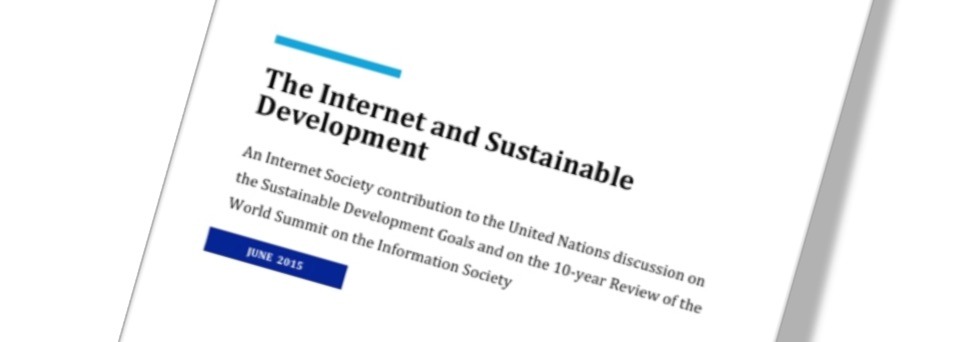We see the Internet as a critical enabler for sustainable development. Our vision is that it can unlock human capabilities and we are committed to working with all stakeholders to fulfill the Internet’s development potential. To that end, next week in New York the United Nations will be convening an Expert Group Meeting on “Advancing a Sustainable Information Society for All”. The Internet Society (ISOC) has been invited to participate to this discussion among other experts.
Since it was formed in 1992, ISOC has worked steadfastly to promote information and communication technologies (ICTs) in development. In a new publication on “The Internet and Sustainable Development“, we propose a framework for multistakeholder partnerships towards that end.
ICTs, the Internet and SDGs
The past thirty years have seen tremendous growth in the capabilities and reach of ICTs. The Internet, especially, has become a critical enabler of social and economic change, transforming how government, business and citizens interact and offering new ways of addressing development challenges. A new approach to development will be agreed this year when the United Nations adopts a Post-2015 Development Agenda based around Sustainable Development Goals (SDGs).
This year is also the ten-year anniversary of the World Summit on the Information Society (WSIS+10). Assessment of its outcomes have demonstrated the value of ICTs and the Internet to development through underpinning the infrastructure for economic and social progress and through providing tools for programmes in sectors such as health, finance and education. That value has grown with time because of rapid improvements in technology, increased bandwidth, and new services like social media and cloud computing. But this was just the beginning. It will continue to grow dynamically as ICTs’ capabilities and reach extend further during the upcoming implementation period for the SDGs.
Priorities for stakeholders and implications for Internet governance
What does this mean for the Internet community? The sustainable development agenda raises a number of particular challenges and opportunities. In our 2014 Global Internet Report, we have identified a few priorities for Internet development cooperation:
- Connectivity and access for all
- Affordability
- Reliability and resilience
- An enabling legal and regulatory environment
- Enhanced human capabilities
To tackle these priorities adequately, an open and collaborative approach to policy, standards and technology development will be crucial. Indeed, the Internet has developed rapidly over thirty years because it was built on a unique model of shared global ownership, collaboration and freely accessible processes for technology and policy development. Going ahead, three governance features of the Internet can continue to make substantial contributions to the SDGs:
- Multistakeholder participation
- Open, universal, interoperable standards
- A collaborative security approach
The role of the Internet Society
The Internet Society’s core values seek to improve the quality of life for people in all parts of the world by enhancing their ability to enjoy the benefits of an open, global Internet.
We work with other stakeholders to enhance the Internet’s contribution to development and build the capacity of Internet professionals and users. One of our concerns is that local voices of our chapters and members around the world be heard in global fora such as WSIS, the IGF, or the CSTD as they discuss ICTs and sustainable development.
Developing local technical and policy capacity is also critical. There are a number of fronts on which we need to act:
- working with other stakeholders to counter spam;
- deploying Internet Exchange Points and strengthening technical ecosystems;
- expediting the deployment of IPv6;
- encouraging multistakeholder dialogue through national and regional IGFs, etc.
The limited coverage of ICTs and Internet in current SDG proposals illustrates the need for more extensive partnership in integrating the two agendas and exploring synergies.
An open and collaborative Internet will be a critical component in achieving sustainable development. If that goal is to be realized, Internet stakeholders must work closely with others in international agencies, governments, the private sector and civil society who are engaged in initiatives to achieve the SDGs. These are the messages we’ll be conveying next week in New York.
Please read our new report about the Internet and Sustainable Development for more information.

